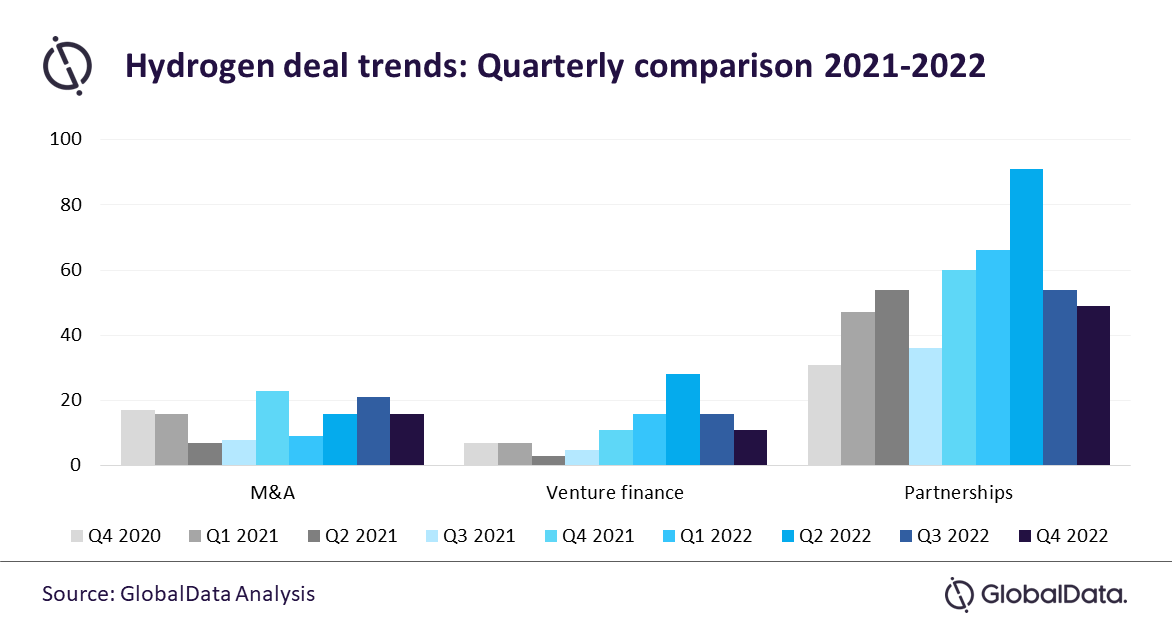GlobalData says green hydrogen production capacity grew by 44% year on year in 2022, primarily driven by investment and capital-raising initiatives. Mergers and acquisitions hit $24.4 billion in monetary value last year, with the research firm noting significant developments in the United States, Denmark, Egypt, Canada, and Portugal.
Cepsa has agreed to supply green ammonia to the ACE Terminal at the port of Rotterdam, for end-use applications. The he Spanish oil and gas supplier said it is now developing 2 GW of green hydrogen at its two energy parks in Andalusia, Spain.
The Renewable Energy Association of Andalusia (CLANER) and the Andalusian Hydrogen Cluster have signed a collaboration agreement to to collaborate in the promotion of green hydrogen in Andalusia.
Deutsche Bahn has ordered 60 hydrogen buses for its DB Regio Bus subsidiary. The German railway operator said that the first vehicles are scheduled to start operating in the German states of Lower Saxony and Schleswig-Holstein from early 2024, with plans to completely phase out diesel buses by 2038.
Hamburg has licensed 25 hydrogen-powered taxi cabs. The municipal authorities in the German city noted that the Toyota Mirai vehicles are already on the road, funded by the “Future Tax ” project. As part of the Climate Protection Act, the city has decided that only emission-free cabs will be registered from Jan. 1, 2025.
Enapter has revealed that it will deliver the latest EL 4.0 device generation of its AEM electrolyzers to companies in France and Taiwan. Hensoldt Nexeya France, an electronics solutions and services provider for industrial customers, has placed another order for 60 EL 4.0 AEM electrolyzers. In addition, Berlin-based Enapter said it has delivered 20 EL 4.0s to Taiwan's Hephas Energy.
ZeroAvia and Birmingham Airport in England have commenced a long-term partnership related to on-airfield hydrogen refueling and regular domestic passenger hydrogen flights. ZeroAvia said it aims to start flying emissions-free, 80-seat planes up to 1,000 nautical miles by 2027.
Topsoe and Sasol have agreed to set up a 50:50 joint venture to produce sustainable aviation fuel (SAF). Topsoe said the venture will produce SAF derived from non-fossil feedstock, using green hydrogen, sustainable sources of CO2, or biomass based on Sasol's Fischer Tropsch and Topsoe's SAF technologies.
This content is protected by copyright and may not be reused. If you want to cooperate with us and would like to reuse some of our content, please contact: editors@pv-magazine.com.



1 comment
By submitting this form you agree to pv magazine using your data for the purposes of publishing your comment.
Your personal data will only be disclosed or otherwise transmitted to third parties for the purposes of spam filtering or if this is necessary for technical maintenance of the website. Any other transfer to third parties will not take place unless this is justified on the basis of applicable data protection regulations or if pv magazine is legally obliged to do so.
You may revoke this consent at any time with effect for the future, in which case your personal data will be deleted immediately. Otherwise, your data will be deleted if pv magazine has processed your request or the purpose of data storage is fulfilled.
Further information on data privacy can be found in our Data Protection Policy.